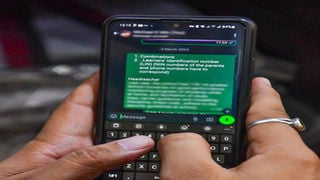
Blue ticks in WhatsApp can create pressure or expectations for immediate responses, as the sender may know when their message has been read. PHOTO/ Michael Kakumirizi
|Prosper
Prime
Watch out when using WhatsApp for business
What you need to know:
In instances of disagreements, misunderstandings, or disputes, screenshots on digital communication platforms can function as evidence to boost one’s stance or elucidate the content of a WhatsApp conversation, aiding in conflict resolution and dispute resolution.
Like social media posts and other forms of electronically stored information, WhatsApp messages can now be used as evidence in court according to a February Court ruling.
WhatsApp is an essential digital communication platform; however, improper use can result in certain issues, as evidenced by a recent court ruling.
Under Section 3 of the Contracts Acts, the High Court ruled that messages indicating that there was an offer made, which was accepted, and the services were provided tantamount to a contract.
The court ruling reflects an effort to accommodate the evolving trends in technology utilised in business transactions. Nonetheless, caution is advised when employing WhatsApp for business purposes, as several factors must be carefully considered before entering into contractual obligations via this platform.
Contracts law
The court ruling, which stemmed from a case where Dr Rodney Mugarura filed a lawsuit against Paramount Hospital Kampala Ltd, a private medical facility in the city, and Dr Simon Begumisa for breaching an agreement that led to the payment of Shs41.5 million in damages, underscored the existence of a commitment, intentions and offer between the involved parties, as governed by contract law.
According to Counsel George Musisi, a partner at PACE Advocates, it is essential to remember that any communication, whether written, documented, or audio, can serve as a contract as long as there is a commitment to provide a service.

Commercial Court in Kampala. Courts will consider whether the parties intended their WhatsApp conversation to create a legally binding agreement. PHOTO/ Michael Kakumirizi
For example, “If I ask somebody to provide a service or good and he agrees, but specifies certain conditions, it demonstrates a level of commitment that should be both specific and quantifiable. This specificity and clarity are essential factors to consider,” he explains.
Meanwhile, in contract law, the intention to engage in business is clearly delineated. When communication indicates one party requesting a service or product, it signifies the intent to conduct business.
Ideally, Courts will consider whether the parties intended their WhatsApp conversation to create a legally binding agreement. This can be inferred from the language used, the context of the conversation, and the behaviour of the parties involved.
Regarding an offer, on this platform, a message can serve as an offer if it clearly expresses the intent to enter into a contract. Similarly, a response accepting that offer can be considered as acceptance provided it is unclear.
Challenges
However, a notable challenge with WhatsApp contracts arises from the possibility of disputes regarding the content or authenticity of messages. Courts may utilise screenshots or other forms of evidence, including emojis, to ascertain the terms of the agreement.
“If you pose a question and receive a response in the form of an emoji, such as a thumbs up, it can be construed as an affirmative action,” he explains.
“For instance, if our conversation has been textual and I inquire, ‘Are we in agreement?’ and you reply with a thumbs-up emoji, it can signify affirmation. Therefore, it could be interpreted as a commitment,” he elaborates.
These are the three critical facets of Counsel Musisi in the aforementioned context.
Blue tick
Normally, to confirm receipt of a message, the blue tick feature can provide useful information to the sender, indicating that their message has been seen by the recipient, and this can be used as evidence.
However, it can also create pressure or expectations for immediate responses, as the sender may know when their message has been read. To address this, WhatsApp allows users to disable the read receipts feature, preventing the sender from seeing when their messages have been read.

A woman uses a smartphone. Any communication, whether written, documented, or audio, can serve as a contract as long as there is a commitment to provide a service. PHOTO/ EDGAR R. BATTE
So, how do you tackle this during contractual relations requirements? Musisi says if a person has not responded, it cannot be assumed that they have seen the communication.
“Consider this scenario: You request sand supply for your site, and after a series of discussions, I quote a price of one million [shillings] per trip. If you do not respond, and I proceed with the supply assuming your silence implies acceptance, it may not constitute a valid contract if there is no assurance that you’ve seen the communication,’’ he says.
Screenshots
In instances of disagreements, misunderstandings, or disputes, screenshots can function as evidence to bolster one’s stance or elucidate the content of a WhatsApp conversation, aiding in conflict resolution and dispute resolution.
“The burden of proof rests on the individual; without evidence, it becomes challenging to substantiate one’s claims. Likewise, if you claim agreement and someone reneges, the responsibility falls on you to provide evidence, whether through witnesses or other means. One effective method is by presenting screenshots to the court as proof,” he says.
Disagreements
It can be challenging to establish specific terms, as disputes often arise not from the agreement to buy or sell, but from the finer details of the contract. While some contracts lack specificity, especially in cases like land agreements, it is crucial to recognise that the devil often lies in the details because it is where disagreements may emerge.
Based on the aforementioned, Musisi suggests utilising the platform for minor transactions under one million shillings, as larger business deals may demand additional details. Otherwise, one could encounter disappointment with the application, as experienced by Fredah Mahoro, an online business dealer who faced disruptions from customers who initially placed orders via WhatsApp but later cancelled on delivery.
“I’ve had an experience like this before. There was a case in Nansana, while my operations are based in Kampala. A client ordered a percolator, and without requesting a deposit, I invested in transportation. Upon delivery, the lady mentioned she encountered some issues and assured payment the next day. Despite my repeated calls, she stopped responding to my WhatsApp messages. From that incident, I learned the importance of securing a deposit before making deliveries,” she recounts.
Ms Mahoro specialises in selling electronics for various companies via WhatsApp, offering products such as televisions, percolators, iron boxes, blenders, and other appliances. Drawing from her experience, she now requires a minimum deposit of 70 percent before delivery.
Useful App
In today’s competitive business environment, WhatsApp has emerged as a powerful tool for SMEs, offering a multitude of benefits that empower them to thrive.
According to Mr Ronald Mayanja Omugalanda, a business coach, SMEs should heavily depend on WhatsApp due to its convenience, ability to provide evidence for sales, and accessibility. Additionally, it facilitates communication for individuals who may not be proficient in writing through the use of voice notes.
Counsel John Musiime of Dentons Advocates echoes a similar sentiment, emphasizing that while the mode of communication for a contract may change, the fundamental elements that constitute a contract remain consistent. These elements include commitment, intent, offer, and payment.
“Uganda enacted a series of laws between 2010 and 2011, facilitating electronic transactions. Consequently, WhatsApp has emerged as a legitimate business platform, evident in the creation of WhatsApp Business accounts for advertising purposes,” he says.
Despite these concerns, WhatsApp offers a secure environment due to its end-to-end encryption, distinguishing it from physical letters,” Mr Musiime asserts.
In the past, many traders traveled to China to source goods, but now, they opt for WhatsApp to communicate directly with shippers, thus cutting costs. While WhatsApp has proven to be a valuable tool, experts advise caution when conducting business through the platform.




